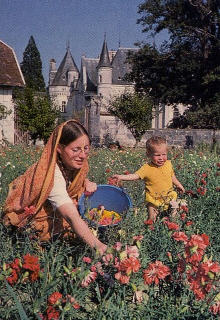
If air and noise pollution, commuting, traffic jams, inflation, crime, overcrowding, and speed mania make you hunger for a saner lifestyle, then you're not alone. Already, a growing number of concerned citizens (including intellectuals and scientists) are asking serious questions about where modern society is going.
In the thought-provoking book Small Is Beautiful (which government officials around the world are reading carefully), E.F. Schumacher airs some of this new movement's views. As he sees it, today's society is based on "greed and envy." Thus, cities and nations have developed an almost exclusive eye for material (mostly economic) gain and have tragically neglected humanity's personal and spiritual needs. In other words, money not mankind matters. The remedy, Schumacher says, is to return to a simpler, smaller-scale, and more spiritual lifestyle.
In 1965, before these ideas were popular, His Divine Grace A.C. Bhaktivedanta Swami Prabhupada traveled from India to the West and appealed for "simple living and high thinking" the motto of the ancient Vedic culture. In general, people responded sympathetically, and many wanted to learn about the Vedic cultural experience, more than five thousand years of natural, spiritual living.
William Ehrlichman was one of the studious ones. While earning his Bachelor of Science degree at the State University of New York (Buffalo), he took a course in Krsna consciousness and read some of Srila Prabhupada's English renderings of the Vedic literature. Before long, Ehrlichman asked Srila Prabhupada for formal initiation. He received the Sanskrit name Bhagavan dasa, which means "one who serves the all-opulent Supreme Lord," and his clear-sightedness and devotion quickly earned him a role of leadership in the Krsna consciousness movement.
In 1973, after Bhagavan dasa had successfully managed the Krsna consciousness center in Detroit for several years, Srila Prabhupada asked him to go to France and help the Paris center. By 1975 he was directing a thriving community of more than one hundred fifty people.

"Success brought its problems," Bhagavan dasa says. "People felt attracted to the Vedic lifestyle, but the big-city atmosphere made things difficult. Of course, we'd been educating people with Prabhupada's books. But still, I was feeling that the time had come to demonstrate the practicality of Krsna consciousness by setting up a model Vedic community."
After months of searching, Bhagavan dasa found an ideal location in the Loire Valley two hundred acres of gently rolling hills, with forests, fields, a large chateau, and five other buildings. The owner, a World War II resistance hero now engaged in philanthropic work, sympathized with the Krsna community's goals. So he sold the property for a low down-payment and financed the rest at excellent terms.
The farm project's name is New Mayapur (after the birthsite of Sri Caitanya Mahaprabhu, who five hundred years ago revived Krsna consciousness for the modern age). The project's thirty-three-year-old coordinator, Visnuma dasa, graduated from Middlebury College, in Vermont, and taught school in Ontario, Canada. He says, "New Mayapur has had instant appeal, both for our members and for our guests. In big cities, when we talk about spiritual life it's hard for people to get more than an intellectual grasp of it. But here the atmosphere is so peaceful and alive that spiritual living comes naturally. At a place like this, people can feel themselves becoming spiritually transformed."
"There are no special qualifications for living at New Mayapur," says Bhagavan dasa. "Anybody with any kind of skill is welcome. And anybody can work the fields and provide his family with a good, wholesome life. Most people are looking for a really peaceful community, so it's important for us to supply what they want." He adds, "People are tired of struggling for the privilege of living in a pressure cooker. We see smaller, spiritual communities as the trend of the future, and we want to accommodate anyone who feels interested in this kind of living."
Farming
Srila Prabhupada, who inspired the New Mayapur project, has written, "Human energy should be utilized in developing the finer senses for spiritual understanding, in which lies the solution of life. Fruits, flowers, beautiful gardens, parks, reservoirs of water with ducks and swans playing in the midst of lotus flowers, and cows giving sufficient milk and butter are essential for developing the finer tissues of the human body."
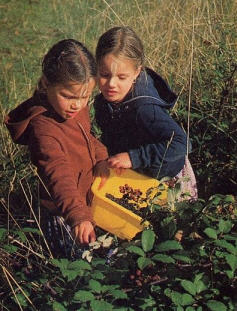
New Mayapur's chief gardener and farmer, twenty-seven-year-old Haribolananda dasa, is in charge of actualizing this Vedic vision on the fields of France. "I come from an English industrial town, Sheffield," he says. "I left school quite young, when I was fifteen, and immediately I got a job growing tomatoes in a nursery for two years. After that I worked as a landscape gardener for two and a half more years. Then, I just dropped out into the youth culture. Eventually, I ran into the Krsna devotees in Amsterdam. They had a rare feeling about them, like pioneers. That aroused my curiosity, and I soon discovered that they were pioneers. They were bringing forward a higher consciousness, and at the same time they had their feet on the ground. So I joined them."
Although ordinarily it takes several years to switch a farm over to organic methods, Haribolananda got some good results from his first organic crop. "We worked a lot of manure and compost into the soil," he says, "and we've been getting yields, for instance in the tomato patch, that would have required almost a ton of chemical fertilizers. And everyone says that our tomatoes taste better than the chemical ones."
Tomatoes aren't the only thing Haribolananda cultivates. "We also raise cucumbers, bell peppers, broccoli, green peas, green beans, lima beans, lettuce, corn, carrots, squash, pumpkins, potatoes, spinach, cauliflower, cabbage, brussels sprouts, and melons.
"Krsna [God] and Krsna's creations are abundant, you know? People today feel out of touch with God and nature, so they don't realize the bounty that's theirs just for the asking (and a little planting and hoeing). If people all over the world raised gardens like this, they'd have no food shortages, and the out-of-doors work would make everyone a lot healthier."
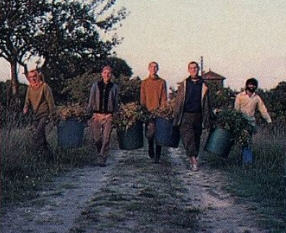
As Srila Prabhupada has said, flower gardens are conducive to physical and mental health. So the devotees have dedicated a full two acres to three thousand carnation plants and five hundred rose bushes, as well as marigolds, chrysanthemums, African gladiolas, and zinnias. Along with some other women, Bhagavan dasa's wife Krsna-bhamini-devi dasi likes to gather flowers and string garlands. "Flowers give the temple a festive feeling," she says. "You naturally think of Krsna."
Haribolananda has added even more variety to what was already a sizable tree population. "There were walnut, chestnut, hazelnut, and cherry trees here when we arrived," he says. "And we've planted a hundred fifty new fruit trees apple, pear, peach, nectarine, red currant, and black currant. The land is also teeming with sixty or seventy kinds of medicinal herbs peppermints, pines, rosemary, comfrey, and on and on. And everywhere you go there are plenty of wild blackberries. We've picked a two-and-a-half-months' supply for making jams, chutneys, and pies.
"Only four people, including my wife and me, work the fields full-time. Of course, sometimes other devotees give a little help maybe an hour of weeding or hoeing or whatever else needs doing." Haribolananda feels that farming in Krsna consciousness has made his life ecstatic.
"I've always enjoyed raising plants, but the satisfaction is a thousand times better when you do it to please Krsna. If you farm out of a spiritual motive, the harvest is a lot more than you can imagine. It's devotion for Krsna. There's pure love involved."
The Children
New Mayapur's forty children have a mellowing effect on the whole community. "We're sure they'll grow up to be strong, saintly people," says Bhagavan dasa, "So everyone really tries to keep their environment peaceful and full of devotion to Krsna. These children are so bright and pure, and, fortunately for us, they're always around." The French public appreciates the Krsna community's efforts to raise their children in a natural, uplifting setting rather than in the cities. "People see that the children here are healthy and happy," says Bhagavan dasa. "It's something they want for their own children."
French-born Jyotirmayi-devi dasi studied ethnology at the Sorbonne, in Paris. Also, she helped to translate Srila Prabhupada's Bhagavad-gita As It Is into a popular French edition, and she now heads the unique school system at New Mayapur. She says, "We follow the traditional Vedic method of education, including subjects like history, geography, reading, writing, and math. The children really like the idea of self-discipline and higher wisdom. The God-centered feeling of Vedic culture is as natural to them as breathing.
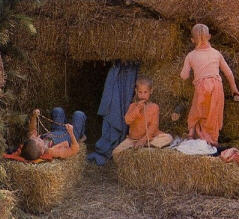
"More and more, parents and students are feeling cheated by the modern educational system," says Jyotirmayi, "because it fails to develop a child's character and sense of purpose in life. When you emphasize these things from the very beginning, the child is a lot happier. Many people underestimate children's potential. Children have minds that are yearning for meaning; that's why they're always asking questions. They want to do something meaningful with their lives, and the longer you wait to guide them, the harder it is for them to mature. And, of course, if the child is left without guidance, he usually develops in an unruly ,way and makes headaches for himself and society."
In Jyotirmayi's view, the students develop their spiritual qualities not so much from theoretical learning as from the living example of their teachers (inside and outside the classroom). "The students and teachers have a very warm, personal relationship. The teachers care not just for the children's academic progress but also for their spiritual development. So the children feel a real sense of security."
A special forest is reserved for the children to play in and, as cottages are built, to live in. Jyotirmayi's face brightens whenever she discusses the forest and her plans for it. "It's a beautiful piece of land with tall trees," she says. "We're clearing out the old trees so we can plant lots of forest flowers. We'll have our own garden, and the children will help the teachers to grow all the fruits and vegetables that the school needs. It'll be like a heaven-on-earth for the children. They'll live naturally, just like in Vedic times." Right now the children go to the forest for gathering wood, learning arts and crafts, gardening, eating their meals, and romping around. Jyotirmayi adds, "We like to get together and put on plays about the childhood pastimes of Krsna. That way we think about Him and remember Him."
Jyotirmayi measures the school's success by "how happy the children are with their teachers and with themselves. Because the people who teach have a sense of spiritual vision, the children spontaneously share in it. This is the real Krsna conscious way to teach and live."
Cultural Life
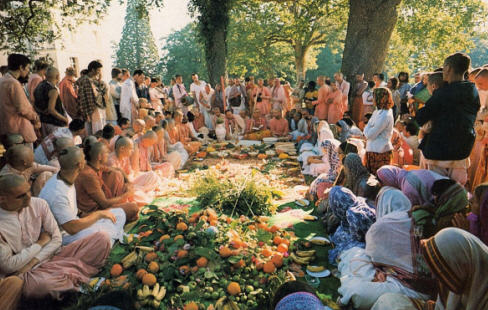
As E. F. Schumacher points out in a recent issue of East-West Journal, "Congestion makes city life intolerable, and the emptiness the mental starvation makes rural life intolerable." Fortunately, New Mayapur transcends these two extremes and combines the best of both worlds. Sophisticated yet simple, this Vedic community is proving in the West what has long been known in the East: intellectual and spiritual interests flourish when nourished by the peace and energy of nature.
New Mayapur serves as the French headquarters of the Bhaktivedanta Book Trust (BBT). Formerly, the Vedic classics were known only to the cream of French society (Victor Hugo, Romain Rolland, and Andre Malraux, for instance). Now the devotees are translating Srila Prabhupada's acclaimed English renderings into deluxe French editions and distributing them throughout the French-speaking world.
French scholars have lavished praise upon both Srila Prabhupada and the BBT for the translations of the Bhagavad-gita As It Is and the Srimad-Bhagavatam, among other works. Dr. Olivier Lacombe of the Sorbonne praises what he terms their "authenticity." Dr. Francois Chenique of the Institute of Political Studies, Paris, says that La Bhagavad-gita tell qu'elle est offers his countrymen "their first contact with the true India, the ancient India, the eternal India." Paul Lesourd, writer and honorary professor at the Catholic University of Paris, vows that if the Gita's message "were wider spread and more respected, it would transform the world in which we live into a better, more fraternal place."
The devotees make a thorough study of the Vedic culture (through formal classes, informal discussions, and tests) and that's what distinguishes New Mayapur from a host of other back-to-the-land projects. Visn uma says, "Spiritual life, developing a relationship with the supreme person, is what gives New Mayapur so much harmony and joy. We not only till the land; we also till our minds to come up with ideas that'll please Krsna. That's the real source of our happiness."
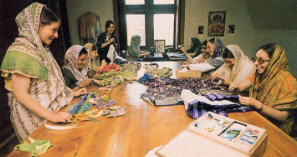
New Mayapur also acts as a melting pot. People from more than twenty countries including France, Germany, Greece, India, Israel, Italy, Poland, Spain, Sweden, the United States, Venezuela, and Vietnam live there. "So many individuals from so many backgrounds are working together happily and communicating with ease. Krsna consciousness is universal," Bhagavan dasa says. New Mayapur's everyday scenes of international cooperation bear out Paul Lesourd's statement that the Bhagavad-gita As It Is offers a key to world peace.
New Mayapur's ambitious social experiment offers us much hope. In a time when the world's secular institutions are hard-pressed to meet even the minimal needs of civilized living clean water and air, decent schools, parks, and so forth New Mayapur's achievements are notable. Organic farming, horticultural innovations, ecological planning, natural medicine, book publishing, spiritual education, community cultural life, personal fulfillment-all spring from the community's God consciousness.
"The environmental crisis," one ecologist has noted, "is an outward manifestation of a crisis of mind and spirit." So we can understand why New Mayapur has no crisis: the Vedic culture has always given first priority to spiritual development. Bhagavan dasa says, "We've had no losses by doing that only gains, in every way."
